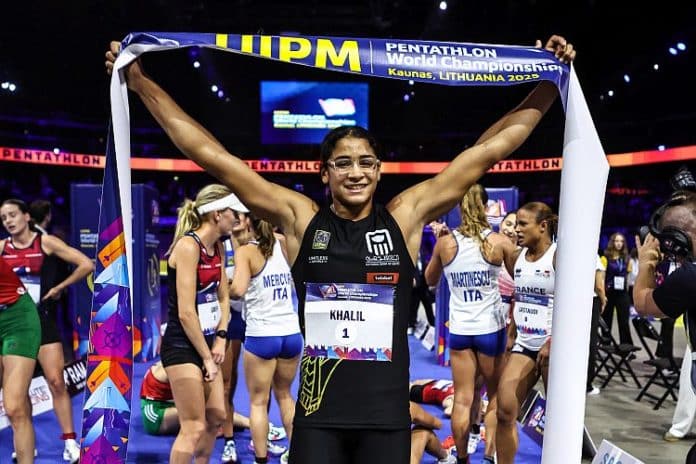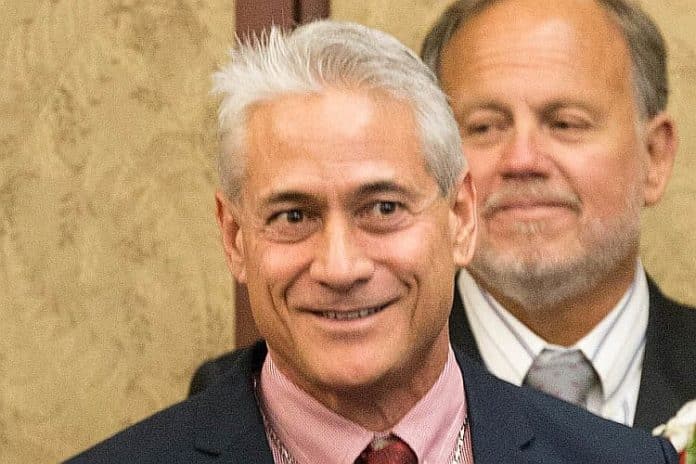★ The Sports Examiner: Chronicling the key competitive, economic and political forces shaping elite sport and the Olympic Movement.★
★ To get the daily Sports Examiner Recap by e-mail: sign up here! ★
≡ INTEL REPORT ≡
The stories on the Web site of the International Federation for modern pentathlon – the Union Internationale de Pentathlon Moderne or UIPM – were glowing, of course, from the just-completed World Championships in Kaunas (LTU), held for the first time indoors, at the Zalgiris Arena:
● UIPM President Rob Stull (USA):
“The local organizing committee and the competition team set a very high bar for themselves and they exceeded it. This is one of the best World Championships UIPM has seen in many years and I am in awe of the achievements of our athletes throughout the week.
“It was an amazing debut of the arena format at a World Championships. Building on the success of Budapest, Lithuania took it to an entirely different level. Athletes, coaches, staff and spectators had a thoroughly enjoyable experience on the first stop on the road to Los Angeles 2028.”
● UIPM Honorary President and International Olympic Committee member Prince Albert II of Monaco:
“It was a really positive and extraordinary improvement. The sport has undergone so many different transformations over the years and this is the culmination of a lot of brainstorming and a lot of ideas.
“I think it’s very exciting, it makes the competition very thrilling – and very interesting also for the athletes. It is a great format, and in an indoor venue like this it takes on a different dimension, a different meaning.”
● IOC member Balazs Furjes (HUN):
“You are making changes, and I think we have to appreciate that the changes are going absolutely to the right direction. It’s spectacular, attractive, dynamic, so I think it’s very good for the sport.
“In Budapest we were very happy to stage the first indoor World Cup, and I know there are three different type of events that Rob [Stull] talks about. One is indoor, the other is a stadium where we could host all the events together, even including a swimming pool in a stadium, and the third one in iconic locations of beautiful cities with the city serving as a backdrop.”
Great. Now, how did the 2025 Worlds – with obstacle instead of riding, changed at the insistence of the IOC – measure up to where the federation has been in the past?
We can a measure some of the ebb-and-flow of the UIPM as a federation by participation in its World Championships. So over the last four quadrennials, plus 2025, the number of men and women competing in the individual competitions in the World Championships looks like this:
● 2025: 95 men + 71 women
(first Worlds with obstacle; all prior with equestrian)
● 2024: 79 + 72
● 2023: 81 + 78
● 2022: 70 + 72
● 2021: 81 + 68
● 2020: no championships (Covid)
● 2019: 88 + 68
● 2018: 83 + 67
● 2017: 77 + 62
● 2016: 96 + 75
● 2015: 90 + 81
● 2014: 97 + 82
● 2013: 80 + 69
● 2012: 106 + 77
● 2011: 102 + 74
● 2010: 84 + 56
● 2009: 96 + 60
So, essentially, the 2025 participation numbers have gotten the sport back to its 2016 level, but about 9% smaller than 2011 and 2012.
Obstacle is not an immediate panacea for the sport, which has almost always been the smallest in the Olympic Games; with 64 total athletes (32 men + 32 women) for Los Angeles 2028, larger now only than surfing (48), and down eight quota places from Paris 2024 (72).
The UIPM reported attendance of 5,000 in the 15,415-seat basketball arena, so there is room for growth.
Stull followed German Klaus Schormann, who was the UIPM leader from 1993 to 2024, and whose primary achievement was to keep the UIPM in the Olympic program. Stull wants to do better, but funding is extremely limited at the UIPM and national levels.
One bright spot for the federation – an opportunity – is teen sensation Farida Khalil, the 14-year-old Egyptian who won four Worlds golds in 2025: the U-17, U-19, Junior (U-22) and senior titles. And Egypt, which wants to be more of a sports power, swept the Worlds individual golds with Moutaz Mohamed winning the men’s title, following Ahmed El-Gendy’s 2024 Paris Olympic men’s gold.
But how can Khalil and an emergent Egypt be leveraged to attract more participants in more countries? With a larger audience will come more opportunities for sponsorship and support.
It’s a difficult cycle to master, but biathlon – which used to be part of a combined summer-winter federation with pentathlon from 1953-93 – has solved the riddle. Can pentathlon ever break out?
¶
★ Receive our exclusive, weekday TSX Recap by e-mail by clicking here.
★ Sign up a friend to receive the TSX Recap by clicking here.
★ Please consider a donation here to keep this site going.
For our updated, 699-event International Sports Calendar for 2025, 2026 and beyond, by date and by sport, click here!



























